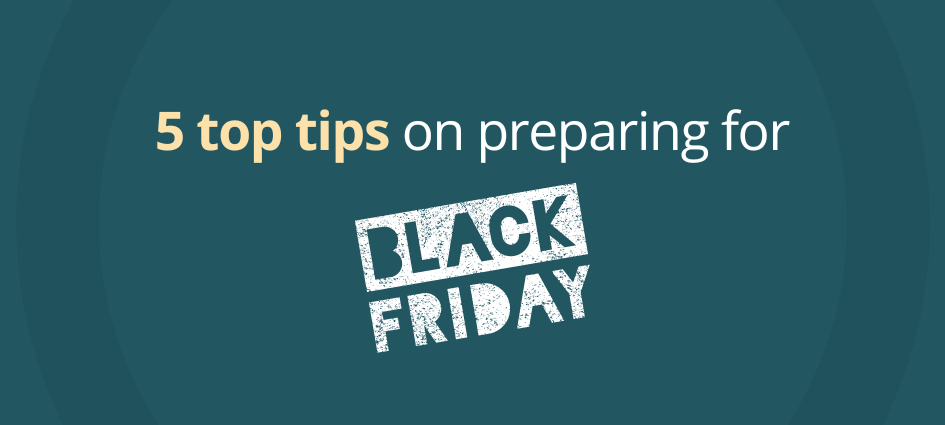November is fast approaching which can only mean one thing – Black Friday is coming!
What was originally just a US tradition to mark the start of the Christmas shopping season has now spread far afield, embraced by retailers and consumers in countries all over the world.
This year’s Black Friday is on 29th November. Together with Cyber Monday on 2nd December, the four-day weekend is traditionally one of the busiest shopping periods of the year. In fact, recent research from WooCommerce indicates that 72% of retailers attribute more than 20% of their annual revenue to the Black Friday/Cyber Monday long weekend.
Here in the UK, Black Friday is a major shopping event, as anyone who has visited their local High Street during that weekend can probably testify! During Black Friday 2023 last year total sales reached an estimated £13.3 billion, up 7.3% year-on-year.
If you’re selling goods or services, whether via your website or your physical shop, it’s clear that it’s worth taking the time to get ready for Black Friday. If you’re unprepared for it, you could lose out on the potential extra sales and happy customers.
With that in mind, here are our 5 top tips on how to make sure you’re Black Friday-ready.
Tip #1: Check your Black Friday stock levels
Once you know which products you’ll be promoting during Black Friday and Cyber Monday, you should make sure you have a large enough supply of them. You don’t want to run an exciting deal, only to run out of stock midway through the weekend. If your suppliers have a long lead time then it may be worth getting your order in early, so you’re fully stocked ahead of time. And if it turns out you don’t manage to sell all of it during Black Friday then don’t worry – Christmas is just around the corner!
Tip #2: Use a mystery shopper
Is the purchase process, whether on your website or within your shop itself, the best it can be? Is your website hard to navigate or difficult to use? Is the inside of your shop laid out awkwardly with the till hard to find? Consider employing a mystery shopper to make a test purchase and let you know what they thought. Their feedback could offer an invaluable insight into how you can improve the customer experience.
Tip #3: Arrange enough resources
You’ll want to make sure that you’re ready for the extra trade you’ll hopefully be gaining. If you sell online, conduct a review of your existing package and check there is enough bandwidth and storage capacity. If you’re currently running near the maximum limit, you might want to sort out more space with your hosting company. For a physical shop, it might be worth ensuring you’ve got all available staff on duty over the long weekend so you can provide the best possible service.
Tip #4: Build up Black Friday excitement
In the days and weeks leading up the event itself, start to create a buzz in advance. On your website and social pages you can post teasers about the great deals you’ll have available. Print some snazzy posters to stick up in your shop window to attract attention as people walk past. That way, when Black Friday arrives shoppers will already be aware you’re planning something and will be looking forward to visiting you to scoop up a bargain.
Tip #5: Plan your Black Friday offers
Have a think about which offers you want to run on Black Friday. For example, will you be setting up a blanket 10% discount off everything you offer, or perhaps a “Buy One, Get One Free” instead? You can guarantee that most of your competitors will be running some sort of offer on Black Friday, so it’s important that you stand out with an amazing deal that will bring in the crowds.
And there you have it. Our top five tips on getting your business ready for the Black Friday weekend.
Finally, don’t forget to try and get out yourself over the weekend and check out the deals. You never know, you might just end up with a bargain!
When is Black Friday this year
This year, Black Friday falls on November 29th. The Black Friday/Cyber Monday shopping period lasts four days, with Cyber Monday on December 2nd.
How did Black Friday originate?
The term “Black Friday” is believed to have first been used in Philadelphia in the 1960s to describe the heavy traffic and crowds that would flood the city before the Army-Navy football game held on Saturday (according to Brittanica).
Retailers began to use this day to offer significant discounts and kick off the holiday shopping season, eventually spreading the tradition to other countries.
How did Black Friday originate?
The term “Black Friday” is believed to have first been used in Philadelphia in the 1960s to describe the heavy traffic and crowds that would flood the city before the Army-Navy football game held on Saturday (according to Brittanica).
Retailers began to use this day to offer significant discounts and kick off the holiday shopping season, eventually spreading the tradition to other countries.
What are some potential challenges businesses might face during Black Friday?
Some challenges businesses might face during Black Friday include:
• Website crashes due to high traffic
• Inventory management issues
• Increased competition from other retailers
• Customer service overload
• Logistics and shipping delays
